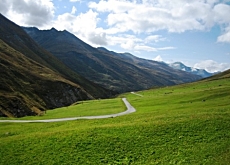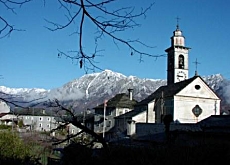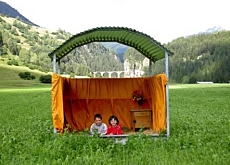Village visit is elevating experience

Winter is still weeks away but the coldest season has already begun in Europe's highest place inhabited year-round. swissinfo journeyed to the hamlet of Juf.
The bus climbed steeply on a narrow road past several tidy settlements and wound atop the treeline as it took me to Juf – 2,126 metres above sea level.
The road and the power lines running alongside are the life support system for what I started to believe must be a cast of reclusive farmers, who, just as Switzerland began to prosper in the post-war years, decided to shun civilisation.
And the longer the journey, the more my imagination ran wild. I began to imagine the small place under siege. We passed men crouched down in the meadows beside the road. Dressed in army green, they were pointing rifles in the direction of Juf.
Deafening gunshots rang out occasionally as the bus pulled into the hamlet, and I cautiously exited, bearing witness to a large, and very dead, marmot being dragged to a parked car.
The gun-toting invaders were hunters who had travelled from the far ends of Switzerland to stalk the large rodent. Juf, I soon discovered, may have been far from anywhere, but was firmly on the hunters’ map.
This sparsely populated place – counting only a couple dozen human souls – had the misfortune at this time of year of being surrounded by huge colonies of marmots. The farmers’ fields were pockmarked with their burrows, some only a stone’s throw from the houses.
My host, Dorli Menn, ventured from her home to greet me and quickly reassured me that Juf was normally a tranquil place, where the two extended families – hers and the Luzi clan – lived in peaceful co-existence.
Business
They rear cattle, goats and sheep, generate a modest second income letting out a handful of rooms and apartments to hikers and skiers, run a couple of small hotels and a restaurant, and generally mind their own business.
As she took me on the obligatory tour of the settlement, I found there was little to see but much to talk about. Dorli said it was her father who, in 1948, ended centuries of what was a nomadic lifestyle common among people living in the Alps’ upper realm.
Before that, the Juf families moved to communities further down the valley where they settled in for the long winter.
“My father married and took the decision to try to stay up here through the winter because moving wasn’t something you looked forward to. You always had to pack up all of your belongings, including your cattle!”
Nomads
Dorli is one of Juf’s few remaining “nomads”, working three days a week in an office in the city of St Gallen, a two-hour drive away.
In Juf, she plays politics, holding the “highest” office representing the concerns of the small but growing communities in the upper valley. Her duties include welcoming the occasional stray journalist wishing to report on Juf’s claim to fame.
We meet one of Dorli’s brothers who demonstrates how dried sheep dung is still used as a fuel to heat homes. Another brother and his wife run the hamlet’s only shop which doubles as the post office.
We’re amused by a herd of goats playfully darting in and out among the houses and a couple of chickens crossing the road. They get to the other side, strutting confidently in the knowledge that the odds are on one of them laying a golden egg before getting run over by a car in this rarefied location.
Off-the-beaten track
Dorli isn’t lost for words when I ask her what makes living in a place that is, for Switzerland anyway, as off-the-beaten track as you can get. And why the people here are staying put at a time when villages in the Swiss Alps lacking a strong tourist industry are emptying out.
“It’s a beautiful valley that, because it’s so high, is not closed in by the mountains,” she says. And it’s fertile. Despite the altitude limiting the growing season to two or three months, Dorli and her neighbours plant spinach, lettuce, carrots, chard and beets.
The livestock provide the locals with plentiful supplies of meat and fresh dairy products, meaning trips to shops lower down in the valley need not be very frequent.
Our conversation is halted by a telephone call. A hunter has shot a marmot in range of the house of one of Dorli’s brothers, upsetting the family with small children. It appears to be a senseless killing since the sportsman leaves the scene without removing the carcass.
A game warden is called to the scene, and Dorli is asked to mediate. Life in Juf is rarely so eventful.
swissinfo, Dale Bechtel in Juf
About 200 people live in the eight hamlets, including Juf, that make up the community of Avers in southeastern Switzerland.
Juf, at 2,126m, is believed to be the highest place in Europe that is inhabited year round.
Juf can be reached by car in about two hours from Zurich, or by train and bus in a little over three hours.
Most of the hamlets have at least one inn and a few holiday apartments or homes.

In compliance with the JTI standards
More: SWI swissinfo.ch certified by the Journalism Trust Initiative












You can find an overview of ongoing debates with our journalists here . Please join us!
If you want to start a conversation about a topic raised in this article or want to report factual errors, email us at english@swissinfo.ch.